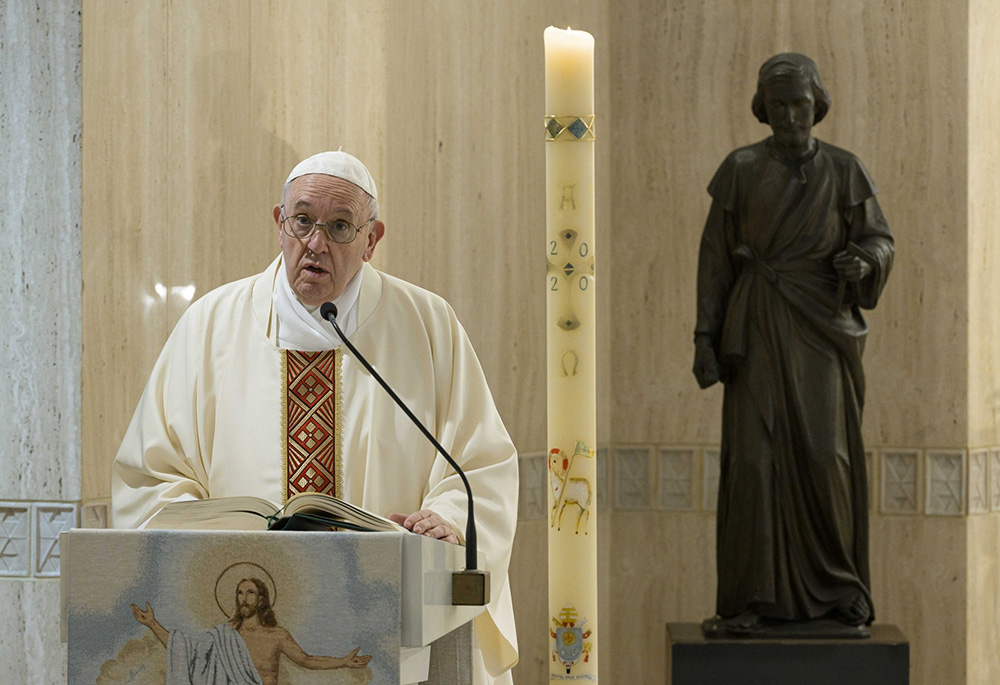
Pope Francis preaches about the dignity of labor and justice for workers during his morning Mass on the feast of St. Joseph the Worker May 1, 2020, in the chapel of his Vatican residence, the Domus Sanctae Marthae. Work "anoints us" with dignity, Pope Francis once said in an address for the feast of St. Joseph the Worker. (CNS/Vatican Media)
Last week, at the AFL-CIO headquarters, a panel discussion on the relationship of labor and the Catholic Church, featuring Patti Devlin from the Catholic Labor Network; Fr. Clete Kiley from Chicago and Unite Here; Meghan Clark from St. John's University; Fr. Evelio Menjivar, a labor priest from the Archdiocese of Washington; and Chuck Hendricks, also from Unite Here and the Catholic Labor Network. A great discussion that shows there is new life in this important relationship.
At Politico, Silas House, chair of the Appalachian Studies Department at Berea College in Kentucky renders his verdict on GOP Senate candidate and Hillbilly Elegy author J.D. Vance: "He's dangerous. So is his book." He calls the book "a treatise in disguise" because the personal narrative is filled with dog whistles. House is searing in his indictment.
Relatedly, at The Washington Post, Dan Balz considers the Ohio Senate race a perfect test case to find out if Democrats can still win working-class voters. If anyone should be able to do it, Congressman Tim Ryan, the Democratic nominee, is the person. For starters, he did not go to Yale nor work as a venture capitalist in Silicon Valley like Vance did.
In The New York Times, Coral Murphy Marcos looks at the potential for sustainable energy in Puerto Rico, the high cost to the economically impoverished residents of the current, fossil fuel-based grid, and the hurdles that need to be overcome. The small town of Adjuntas, in the central mountains, is ahead of the curve but the island lacks the resources to invest in the kind of conversion to sustainable energy that is needed.
Advertisement
An unintentionally sad story at Business Insider, in which the author, Racheal Ede, relates how she overcome her Catholic upbringing with its moral disdain for the pursuit of wealth, and decided not to feel guilty when she started making money. Conservatives like to warn and fret about accommodating to the culture when it comes to pelvic theology, but this is the kind of accommodation that is at the root of the loss of faith in our time.
Nothing makes my day the way being attacked by Michael Voris of Church Militant does. And to be lumped together with "rogues" like Cardinals Blase Cupich, Sean O’Malley, Óscar Rodríguez Maradiaga and Joe Tobin is even more of an honor. And, of course, he attacks NCR, which another reason to join our Spring Fund Drive! I would send Voris chocolates but I fear he might misinterpret the gesture.
At Common Edge, Michael Crosbie interviews podcaster and writer Jim Krueger about a recent podcast he did posing the question: Did a highway kill a city? The city in question is Hartford, Connecticut, and the answer to the question is "mostly yes." Actually, the self-inflicted wound consists of two highways, I-84 which runs on an east-west axis and I-91 which runs north-south, and separates the city from its outstanding natural feature, the Connecticut River. They explore the role of racism as well as the inability to foresee the disastrous effects of their urban planning. This was all done in the 1950s and 1960s, so not so long ago. A warning to us all: There is no myopia so complete as being a child of one's own age.





